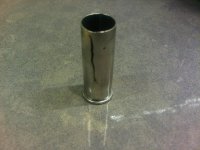I have an issue with winchester ammo. This is the third shell I have had split down the side. I will have pictures later this week. The first accurance was with 30-30 shells and today with a 38 round. These WERE factory rounds (not reloaded), but they were not new, they had been stored for awhile but would that matter?
Does brass weaken with time?
Any input would be appreciated. I kept the 30-30 shell casings just as a riminder but today when unloading the cylinder of my s&w 357 I couldn't get the ejector rod to budge so after some use of force (beating on it) the shell casings came out and there in my hand lay "De ja vu" another winchester casing spilt down the side. The gun was unharmed thankfully but
What gives? I am perplexed.
Thanks
Does brass weaken with time?
Any input would be appreciated. I kept the 30-30 shell casings just as a riminder but today when unloading the cylinder of my s&w 357 I couldn't get the ejector rod to budge so after some use of force (beating on it) the shell casings came out and there in my hand lay "De ja vu" another winchester casing spilt down the side. The gun was unharmed thankfully but
What gives? I am perplexed.
Thanks

